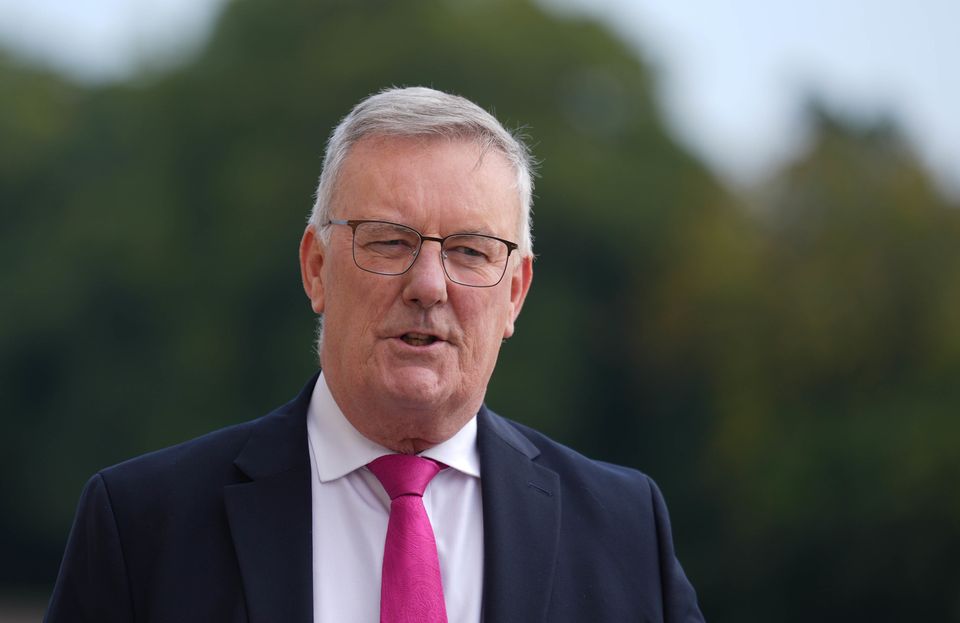First Minister Michelle O’Neill said the job of transforming the health service will not “fall on the shoulder” of the Health Minister Mike Nesbitt alone.
A number of Executive ministers joined health staff to hear a keynote address from Professor Raphael Bengoa who was behind a major blueprint for reforming health services in the region.
Recommendations from the professor’s 2016 report, Systems, Not Structures: Changing Health And Social Care, were never fully implemented amid the collapse of two assemblies and the Covid-19 pandemic.
Prof Bengoa said he welcomed the opportunity to return to see how health transformation remains an overriding priority in Northern Ireland.
Ms O’Neill; deputy First Minister Emma Little-Pengelly; Health Minister Mike Nesbitt; Agriculture and Environment Minister Andrew Muir; and junior minister Aisling Reilly; were among those who gathered at La Mon Hotel on the outskirts of Belfast.
The First Minister, who was health minister when the Bengoa report was published, said, despite the challenges since then, she believes progress has been made.
“I don’t think anyone can dispute the fact we need to fix our health service. I think we have the blueprint in the professor’s work eight years ago and now I hope we can get on in earnest as a new four party Executive and make it happen,” she said.
“It’s very clear that we need to do the day-to-day work in the department while also transforming alongside that.
Stormont Health Minister Mike Nesbitt said Professor Bengoa’s return was one of his key aims when he took on the ministry (Brian Lawless/PA)
“We need to transform our health service, I think that’s what everyone is here for today. We know that there’s much more to do but the work of the Executive now is to support the health minister in how we’re going to transform, collectively how we can tackle the inequalities that exist out there.”
Asked whether Sinn Fein will back Mr Nesbitt in difficult decisions, Ms O’Neill said: “This is a collective effort. We need to work on this together. This is not going to fall, I believe, on the shoulder of one minister.
“I am the First Minister of the Executive and I’ll work with every other Executive colleague. I want us to fix our health service, I want us to invest in our workers, they’re the backbone that keeps the health service running.”
Earlier, Mr Nesbitt said the reform of health and social care is about more than reconfiguring hospital services.
Mr Nesbitt said he hopes Prof Bengoa’s speech will help “refocus attention on what needs to be done”.
He said he had invited the health policy expert back to Northern Ireland as one of his first initiatives after taking on the Stormont ministry in May in order to “reboot the reform agenda and to provide his assessment of what needs to be done”.
“Systems Not Structures was about much more than our hospitals. It’s about fundamentally rebalancing provision to provide more care at community level, to focus on prevention rather than treatment, and to help people manage conditions and live long healthy lives,” he said.
“Achieving this shift is the work of a generation.”
He added: “Reconfiguring hospital services remains an important part of the overall jigsaw, as I emphasised last week when I launched the Hospitals – Creating A Network For Better Outcomes document for public consultation.
“I have also on many occasions stressed that improving population health and tackling health inequalities are among my key areas of focus.
“We can only hope to achieve this, and deliver meaningful reform, if we adopt a whole-government approach with support right across the Executive, the wider public sector, our communities and our clinicians.”
Speaking ahead of his address, Professor Bengoa said he is “very aware of the challenges Northern Ireland’s health service has faced over the period since 2016”.
“It is by no means unique in that regard. Right across Europe, there are major struggles on a number of fronts.
“These include balancing short-term pressures with long-term reform needs, dealing with growing demand and greater patient complexity, and recovering from the impact of the Covid-19 pandemic.
“The analysis in Systems Not Structures is just as valid today as when it was published and the need for transformation, backed by sustained resources, is ever more pressing.”
Prof Bengoa has worked for the World Health Organisation in Copenhagen and Geneva and co-authored numerous health care policy documents in Spain and internationally.
